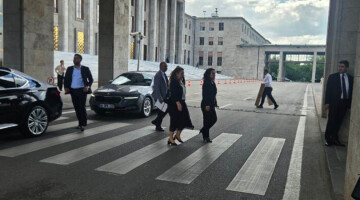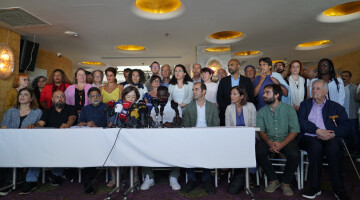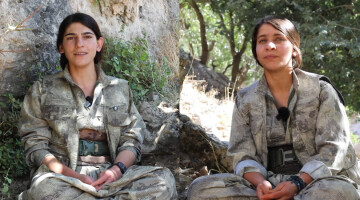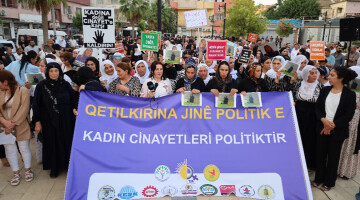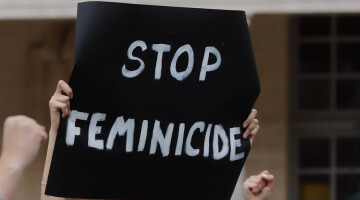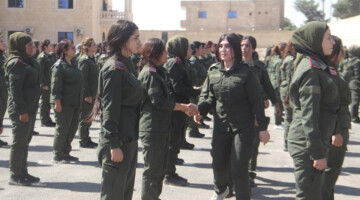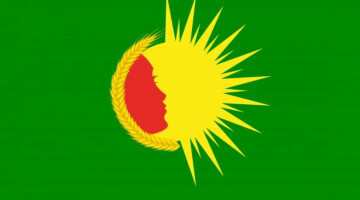Women's revolutionary struggle is a resurrection of society and humanity that were torn down alongside women, as much as it is the vengeance taken from the thousands years old patriarchal system with the tradition of pain, exploitation, massacre and rape.
This tradition supports and complements itself from Latin America to the Middle East. The strongest example of this is the Rojava Revolution in which women are the revolution itself.
This revolution is a result of the Kurdish women's decades-long struggle and has also left a powerful heritage to the tradition of revolution across the world. YPJ engraved its name on the resistance and victory in Kobanê that became a hope to humanity.
ANF spoke to Lorin Efrîn, who is one of the combatants protecting the revolution since its very beginning, on women's efforts of defense before the YPJ, and the establishment of the YPJ.
Since when have you been taking part in the efforts to defend Rojava Revolution?
I have been taking part in the efforts to create and defend the Rojava Revolution since the first phase that began in 2011.
How did Kurds move from the stage of a people not recognized as an identity to the level of being a folk with the power for self-governance? What was the cause of your need to embark on defense efforts?
You would remember the atmosphere in Arab countries during 2010 and 2011. The Arab Spring was breathing across the entire geography, giving everyone the sense that a revolution would take place very soon. This situation created a vacuum in Syria due to both internal and external balances of power.
Many powers tried to take advantage of this vacuum and to establish new balances in order to further their self interests. Kurds did not have concerns over their interests. Our sole goal was to preserve our existence as a people that has lived without an identity and got assimilated for thousands of years, and to attain our freedom. So we were trying to gain our most basic rights.
Efforts for a revolution for this holy and legitimate goal were launched in 2011. Women were the ones to participate in these efforts first and most cheerfully. This surprised everyone. Kurds were ignored and excluded as a people by the regime but Kurdish women were facing the same treatment in the Kurdish society as well. Ours was a two-level uprising to slavery. As every revolution has a spirit, the degree to which women would contribute to this revolution was understood very well.
Developments took place and gains were made day by day. Since pre-planning does not do much good in such situations, it is more beneficial to fill the vacuum of the moment. And we did this well. As you know, the revolution in the cantons developed on July 19, 2012 when the rights steps were taken at the right time.
These times were when it was hard to tell who was involved in what with whom. There were many regional and proxies. Everyone tried to weaken the others in order to get stronger. And the regime threat was still existent. Therefore, it was a necessity to protect the gains and the people. This was a condition for survival.
Thus, People's Self-Defense Forces (Yekitiya Xwe Parastina Gel) was formed in 2011. It was semi-professional and lacked armaments. But it had a lot of faith and determination.
Through the trainings it received and the sacrifices it made as it got stronger during the conflict, it became a more potent and effective force. In other words, it became a professional army and transformed into People's Defense Forces (YPG) with thousands of members with the revolution.
What was women's position and participation in the YPG like after the YXG?
Let me first state that the approach towards women in Kurdish society is under the pressure of feudal perceptions. Therefore, women's will is either ignored or oppressed and viewed as weak. We overcame this a little bit with the effort our Leader put up over the past 20 years, but it was uncommon for women to become a political power in their houses, streets, neighborhoods, and districts. The public acclaim, therefore, took some time. Imagine a society where women take their guns to leave the house and protect their cities, streets, fathers, brothers, and husbands.
Beginnings are often difficult and our beginning was a truly difficult one. There were fathers that beat their daughters, locked them inside houses and prevented them due to the existing pressures. But these did not stop women. Despite the violence and isolation, women ran away, resisted the pressures, and imposed their existence upon the society. With their stance, determination, participation and revolutionary claims, women led the defense in practice, even at the very beginning. Still, organization was carried out jointly.
Our male comrades that grew up with the reactionary culture of our society had a sense like “How can I fight alongside women, how can I receive orders from women?” Still, it was not that hard for them to accept it because our sense of freedom developed early on owing to the philosophy of our Leader. The force was mixed at first but we later got organized as units inside this mixed force district by district.
We carried out 'village raid' military exercises in our villages in order to prove ourselves to the society. We once did such a military exercise in the village of Şikefta. When we took off our masks at the end of the exercise, the residents of the village saw that we were all woman soldiers, they got were surprised and proud. This spread across Efrîn like a legend and had a positive impact.
Of course, first our families and the society were influenced as our training continued, the revolution developed and people's stance with a will emerged.
As you know, the July 19, 2012 revolution spread across all the cantons. Rojava Revolution meant more values and gains to be defended alongside the revolution itself. As the youth of this people, we felt more responsible than everyone else. Later, YPG was announced together with the revolution. The announcement of YPG in Efrîn was again led by us, women.
When serious clashes broke our afterwards, men tried to hold women back from the front lines. We overcame such mistakes and misled approaches. Women took part in the clashes against Jabhat al-Nusra in 2012. For the first time, women professionally participated in the war at Qastele hill in the fall of 2012. Consequently, male comrades admitted that they got strength from the women and were impressed by their natural responsibility. We were both getting experiences and proving our capabilities as women.
What made you decide to form a women's army?
Women's participation in the army increased as of 2012. In addition to this quantitative increase, a qualitative development also took place as women gained fighting experience and received training. This made a leap necessary and the first all-female battalion was established inside the YPG with the participation of 80 woman comrades.
Other cantons followed this initiative. Women's battalions were established in other cantons because women's search, participation and capacity increased to a point that went beyond the general situation.
Women constituents of the YPG from all cantons came together several times in order to satisfy distinctive needs and discuss their stance, duties, missions and roles. Here, they made the decision to form an army of women. This decision was not made just to be a distinctive unit as it had strategic goals as well. It was necessary to shape the revolution, change the perceptions and reactionary aspects of society, and carry out a social revolution for a whole a revolution. This is because it was us who needed this revolution the most and we believed that the level of women's liberation was the level of social liberation.
On the other hand, even though the women of this geography grow up with war and experience its every aspect and immorality, we saw the army as a precaution to prevent the war from becoming more permanent because women are fair and dedicated to the moral values of humanity.
During this process, we overcame our worries with our insistence on protecting the revolution and our country by uniting it with our Leader's trust in women and the perspective of women's organization. Besides, women had begun to get organized in the mountains of Kurdistan 20 years before us and they succeeded despite many hardships. This gave us strength and the gains Kurdish women shed a light on our path.
After such debates, YPJ was announced during a meeting on April 4, 2013 in which delegates from all cantons participated.
We were enthusiastic and our morale was high. Our goals were big even at our first step. For example, we felt responsible for the liberation of all women in the region, and even in the world, and we discussed how we could contribute to the struggle of those women.
It was as if the world had been recreated that day. The sun rose only for us that day. Our new formation was to say “stop” to the injustices in our geography and to the unjust course in the rest of the world. Further developments took place as this faith grew.
We organized ourselves in a variety of areas ranging from heavy weaponry to branches. We took part in many battles and offensives. We put up a heroic resistance and a stance of self-sacrifice. YPJ strengthened itself with its ideological training as well as military training. It became the leading force of urban warfare.
During this stage, the stance of some of our comrades always gave us trust and became a driving force. The influence of comrade Sılava, who joined the YXK during its establishment and took part in the military council, is indisputable. She is the first martyr of the YPJ. Her stance was quite different. She was a commander that did not like passiveness and made efforts for the development of her female comrades as much as her own development. Her self-confidence was based on her trust in her gender.
During the founding congress, she was the one to state that we were late to hold this congress and to form our self organization, and that we had to accelerate our organization which was a longing of hers. Therefore, she became the main force that pushed this development.
Similarly, we had another comrade Berivan who fell a martyr during the same time with comrade Sılava. She was a mother with an 11 year-old child. She felt responsible for the revolution and social progress, and had a stance that rejected the conditions surrounding women.
She was a mother in full sense of the word. She was seeking to leave a beautiful future for her child. During a training, she said “I am a mother and I will fight for my child and all children and mothers.” She was enthusiastic, excited and fearless. She was always at the frontline. These values determined our stance and shaped our organization. From now on, our goal is to be worthy of them.
How did 4 years pass for the YPJ, what kind of results were achieved?
Frankly, we left behind a period that with resistance and struggle becoming a gain of the people and the guarantee of the revolution. Now as I look back, I see that YPJ became the name of a movement representing all resisting women in a revolution which became a hope to the peoples of the world. How else could the resistance in Serekanîyê and Kobanê be described?
This influence did not only change the perception towards women. It also paved the way for trust in women's leadership and ability to make the world a better place.
This impact became the example of resistance, struggle and success for women not only in the region but across the world. Great efforts have been made and a price has been paid until this stage. This was not easy but we made it. Now, the YPJ's resistance became a proof of the certainty of revolution and leadership of women. We have always felt and seen the support of peoples and women that resist across the world.
At this point, how do you define yourself within world women's struggle for freedom? Do you have a message on the occasion of March 8?
We always drew strength from the struggle women have given in history. Therefore, the gains made in this recent process are a heritage from the history of resistance. In a way, we can say that the YPJ is the freedom army of world's women.
This was a conscience choice. We know that women are strong together. This strength is an dauntless stance and guarantees success. We should expand our goal and struggle in order to avenge all the pains women around the world have suffered historically. With my trust that we can transform all days into days of resistance, I congratulate March 8 for women that resist and struggle from Efrîn to Shengal, from Kirkuk to the mountains, and everywhere in the world.






